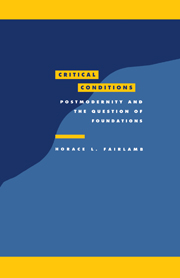Book contents
- Frontmatter
- Contents
- Preface
- Acknowledgments
- List of abbreviations
- Introduction
- 1 Fish's strong conventions: the mind's own world
- 2 Brave new words: postmodernism on epistemology
- 3 Theory and/or deconstruction: Derrida's slippage
- 4 Gadamer's universalism: the limits of hermeneutic authority
- 5 Critical politics: deconstruction for Americans
- 6 Foucault's microphysical politics: Big Brother is missing
- 7 Habermas' neo-formalism: theory as praxis
- 8 Critical theory and postmodern localism: rebels without a cause
- Conclusion
- Bibliography
- Index
2 - Brave new words: postmodernism on epistemology
Published online by Cambridge University Press: 01 June 2011
- Frontmatter
- Contents
- Preface
- Acknowledgments
- List of abbreviations
- Introduction
- 1 Fish's strong conventions: the mind's own world
- 2 Brave new words: postmodernism on epistemology
- 3 Theory and/or deconstruction: Derrida's slippage
- 4 Gadamer's universalism: the limits of hermeneutic authority
- 5 Critical politics: deconstruction for Americans
- 6 Foucault's microphysical politics: Big Brother is missing
- 7 Habermas' neo-formalism: theory as praxis
- 8 Critical theory and postmodern localism: rebels without a cause
- Conclusion
- Bibliography
- Index
Summary
Beyond foundationism
In what Jean-François Lyotard has called the postmodern condition, anti-foundationism is a commonplace. Richard Rorty concludes “that the intellectual tradition [of foundationist epistemology] has not paid off, is more trouble than it is worth, has become an incubus,” and that we need to displace philosophy-as-epistemology with philosophy-as-hermeneutics (CP, xxxvii). Similarly, Stanley Fish attacks literary theorists who seek a general hermeneutic theory to determine particular literary interpretations in comparably global terms, arguing against theory “that this substitution of the general for the local has never been and will never be achieved. [Foundationist] theory is an impossible project which will never succeed” (AT, 110). And Lyotard says of the future-science that it too must abandon a deterministic model of knowledge, and that even now this future-science “is producing not the known but the unknown” (PC, 60). In each of these cases one finds a rejection of the traditional epistemological quest for a foundation of knowledge, truth, or meaning. And in each case, one finds a movement toward a more conventionist or relativist model of cognitive or hermeneutic authority.
In each case, however, one finds a problem common to all anti-foundationist positions: a gravitation towards claims about philosophy, literary theory, and science in general. The problem is obvious: How does one rule out categorical theories in principle without getting categorical? How does one universalize about theory's inability to universalize? The intransigence of these problems suggests that the subversiveness of the postmodern condition is easily overstated as “the end of epistemology” rather than “the end of foundationist reduction.”
- Type
- Chapter
- Information
- Critical ConditionsPostmodernity and the Question of Foundations, pp. 57 - 80Publisher: Cambridge University PressPrint publication year: 1994



